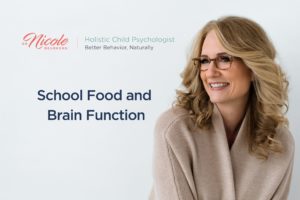Parents looking for natural alternatives to medication to treat their child’s attention, mood, and behavior challenges will find numerous options available. One of the most researched nutritional approaches is adding more Omega-3 fatty acids to the diet through food and supplementation.
There is a significant amount of research about Omega-3 fatty acids and various childhood symptoms and conditions, particularly attention, mood, and behavior issues. Most studies show that children with these conditions experience symptom improvement when they receive Omega-3 supplementation. Research has also demonstrated that many of these children have abnormally low levels of Omega 3’s when compared to the general population, making it an appropriate target for supplementation.
Omega-3 and Omega-6 are “essential fatty acids”, meaning they are required for proper brain and body function. They must come from our diets because our bodies cannot make them in large enough amounts for optimal function. Research has shown that many people are deficient in Omega-3’s in particular, which is unfortunate since they are essential for brain function. In the United States we tend to get an overabundance of Omega-6’s in our diets via oils and processed foods. Having an appropriate balance of Omegas is important, as too much Omega-6 can lead to suboptimal health. The standard American diet has very little Omega-3, so making sure we have adequate levels of this nutrient is important.
Omega-3’s are an important component of cell membranes (the barrier of the cell) and have anti-inflammatory effects in the body. They surround the cells of the brain and nervous system, providing important protection and function for these cells. Omega-3’s are in the following types of foods: fish, seafood, grass-fed animals, eggs from chickens eating natural diets, dairy products from grass-fed cows, flaxseed, chia seed, walnuts and some other nuts, and avocados. However, the long-chain Omega-3 fatty acids are most important and are known as EPA and DHA. These long-chain fatty acids are obtained through food or supplements and are found only in marine sources such as fish, shellfish, algae, and seaweed. Consuming high quality fish and seafood products on a regular basis is the best way to improve Omega-3 levels through the diet. I am convinced that the highest quality fish and seafood available can be found at Vital Choice, where they are focused on bringing the highest quality wild caught seafood products to consumers.
While high quality seafood is the best way to increase Omega-3 intake via diet, a simpler way for many people is to increase Omega-3 levels through taking supplements. These supplements have been shown in research studies to be very safe, with no significant risks to taking them. When using Omega-3 supplements, sometimes referred to as fish oil supplements, it is essential to use high quality products. The fish oil needs to be from a reputable company that conducts rigorous quality and safety testing to ensure there are not contaminants such as mercury or other dangerous substances in the fish oil. Two such companies are Nordic Naturals and Vital Choice. These supplements come in various forms, generally liquid, capsules, or gummies. Note that the capsule or liquid forms are most cost-effective, as the gummies or other chewable products require taking many more at once to reach the needed dose. It is also generally the case that gummy products contain high amount of sugar and other ingredients we would prefer to avoid. Keeping capsules or liquid in the refrigerator helps reduce any bad taste that can occur with fish oil, and are also available with various added flavorings. It is not wise to mix fish oil supplements with water or milk, as the oil does not combine well with these liquids! However, the oil can be mixed into smoothies or other foods to assist with taste and texture tolerance as needed.
When selecting a fish oil supplement it is important to look for a combination of DHA and EPA, as research has shown that both are needed for symptom improvement. Dosing varies depending on the age and size of the individual, so work with a knowledgeable healthcare provider familiar with Omega-3 supplementation to determine the best dosing for your child. In general the concern is that the dose is too low to have an impact, so high dosages may be necessary for a particular individual. The recommended intake of Omega-3’s for healthy individuals ranges from 200mg daily for infants up to 500mg for adolescents and adults. Studies of children with behavior, attention, mood, and developmental symptoms have used dosing up to many thousands of milligrams of Omega-3’s daily. At very high doses some people can have mild digestive side effects including “fishy burps” (aftertaste), loose stools, or stomach upset. These symptoms are rare and generally mild. If they occur it is appropriate to try a different brand/type of fish oil, take the supplement with food, or change the time of day the supplement is taken. If your child is on any prescription medication, especially blood thinning medications, check with his/her physician before using Omega-3 supplements.
It generally takes many months of increased Omega-3 intake for the full benefits to be achieved. Many people notice improvements more quickly than that – some within a few weeks. When using this strategy it is important to stick with it even if symptom improvements are not immediately recognized. While this article has focused primarily on the benefits of Omega-3’s for reducing mental health symptoms, it is worth noting that there are numerous benefits for physical health as well. Omega-3’s are vital for supporting heart health, reducing inflammation throughout the body, and supporting blood pressure regulation to name just a few. Increasing Omega-3 intake through food and supplements is an excellent way to improve the health of the entire family.
Have you used Omega-3’s with your child or family? Leave a comment below to tell me about your experience.
Helpful References:
Raine, A., Portnoy, J., Liu, J., Mahoomed, T., & Hibbeln, J.R. (2015). Reduction in behavior problems with omega-3 supplementation in children aged 8-16 years: a randomized, double-blind, placebo-controlled, stratified, parallel-group trial. The Journal of Child Psychology and Psychiatry, 56(5), 509-520. Retrieved from http://www.researchgate.net/profile/Joseph_Hibbeln/publication/264985093_Reduction_in_behavior_problems_with_omega-3_supplementation_in_children_aged_816_years_a_randomized_double-blind_placebo-controlled_stratified_parallel-group_trial/links/546227430cf2c0c6aec1a75a.pdf
Sinn, N., Milte, C., & Howe, P.R.C. (2010). Oiling the brain: A review of randomized controlled trials of Omega-3 fatty acids in psychopathology across the lifespan. Nutrients, 2(2), 128-170. Retrieved from http://www.ncbi.nlm.nih.gov/pmc/articles/PMC3257637/
What You Should Do Next:
Sign up for my Better Behavior Naturally community newsletter
Sign up for my newsletter to get tips, resources, and supports to improve your child’s attention, anxiety, mood, and behavior…while making your job as a parent easier.
Enroll in one of my workshops
Check out one of my many workshops where you’ll join my exclusive community of parents in a one-of-a-kind virtual resource accessible 24/7. Whether you’ve got a child with a diagnosis like autism or ADHD, or are becoming more and more frustrated with a child who struggles to listen and cope, these workshops are designed to give you the information, tools, and support you need…whenever you need it.








